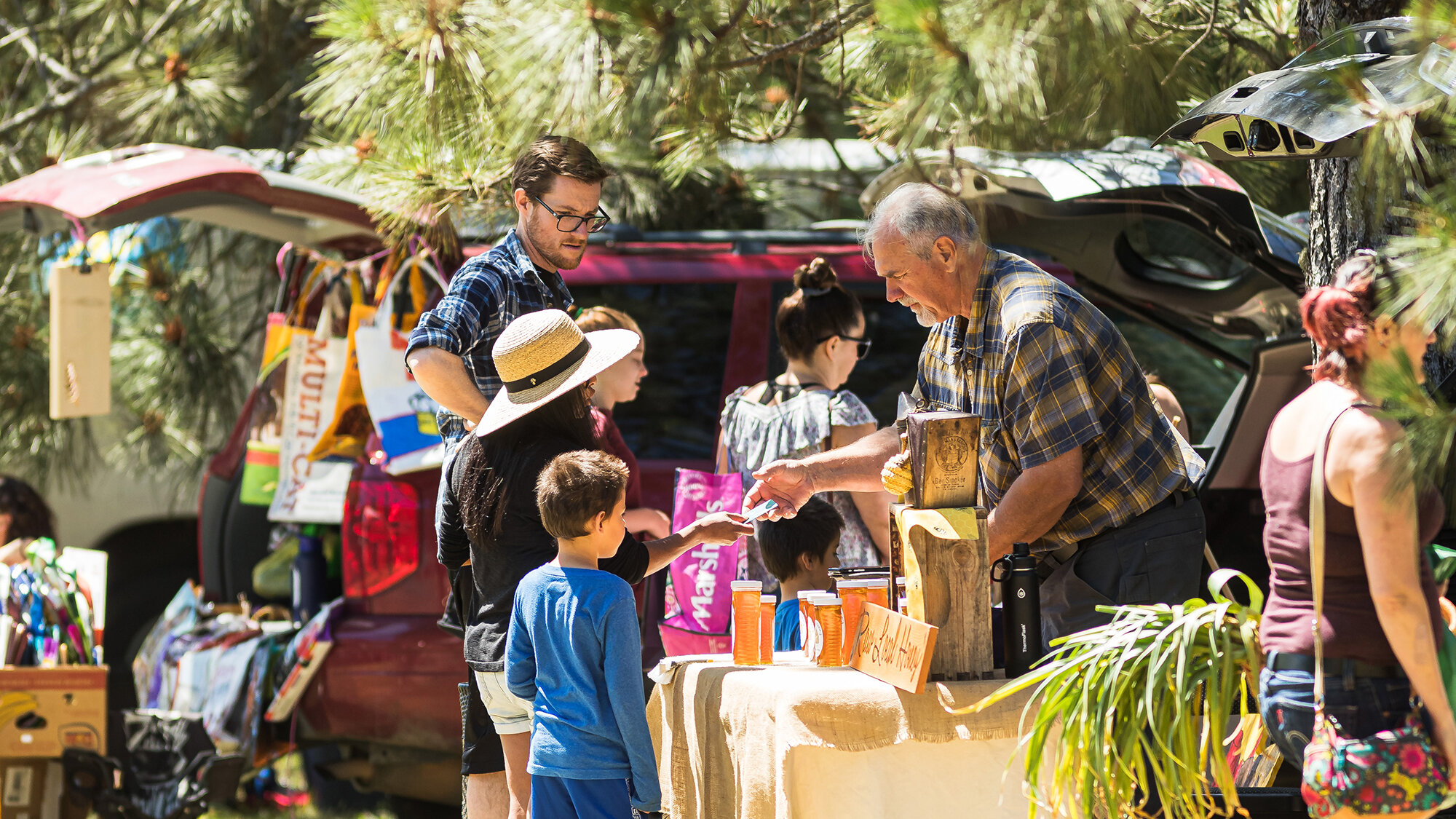Fresh Ideas

COVID-19 forces local food producers to get creative, and
their response is a full-grown business success.
Story by Jennifer Grafiada Photos by Thomas Boyd
There was always the hope for, and for some even signs of, a silver lining.
Even as COVID-19 forced citizens to stay in their homes, locked down economies and caused businesses and entire industries to suffer, there were some that boomed: Bicycle shops. Video game creators. Video conference software developers. Liquor stores. Toilet paper manufacturers.
And, as turned out, local food producers. Shelter-in-place mandates presented Douglas County producers with a potentially serious challenge. If the pandemic forced the Umpqua Valley Farmers’ Market to shut down, how could farmers get their products to customers?
The answer turned out to be equal parts creativity and technology. And it has provided another outlet for consumers to find the fresh, local food they want—even while the farmers’ market remains open and continues to thrive. It’s also helped vendors increase sales and revenue, surprising developments that they are confident will continue after social distancing and the public wearing of masks are things of the past.
“COVID-19 has created a beautiful boost to the local food movement,” says Amanda Pastoria, farmers’ market manager. “People are concerned about the quality and safety of their food. They are also taking care of their neighbors’, friends’ and families’ businesses.”
With additional protocols in place to increase safety in the COVID environment, the farmers’ market has operated through the lockdown, offering locally grown goods to its growing base of loyal customers. Some UVFM vendors, however, have created an alternative model that they are using successfully as both a stand-alone enterprise and a supplement to their market booths.
For Rylan Guillen of Champion Club Farms, creativity was born of necessity. He wanted a back-up method of selling food if the farmer’s market was shut down.
“There is nothing more American to me than options,” he says.
Guillen found an answer in Facebook groups where food producers post merchandise and customers place orders in the comment sections. Weekly pick-up points and times are arranged and the transactions are completed. Guillen now runs two Facebook groups himself.
Online ordering allows customers to shop for food anytime and from virtually anywhere. It also helps with inventory control, giving producers an idea of how much they can sell in a given timeframe. The result is a farm-to-table process that connects consumers directly with producers.
I found (my sales increase surprising), but when I mentioned it to a customer, she said that right now she just wants to know where her food is coming from.
— Chris Van Dyke, Local Fixe
One of Guillen’s groups meets for pick-up Thursdays from 8 to 9 a.m. at Roseburg First United Methodist Church. Another meets Thursdays from 5 to 6:30 p.m. at Dakota Street Pizza in Sutherlin.
“(This is) a trade model originally created in Finland,” Guillen writes on his groups’ Facebook pages. “Imagine being able to shop a variety of fresh, local and ethical produce from the comfort of your own home…whilst supporting small-scale producers in your community?”
DC Modern Roots, a farm based in Winston run by Denise and Chad Northcraft, decided to try the same model. They teamed up with Erin Saylor of Saylor Farms in Lookingglass to run a Facebook group pick-up called “42 Connect,” which meets from 11 a.m. to noon Thursdays on property adjacent to Treats Café in Tenmile. Within two months of its formation, the group grew to more than 2,000 members.
Papa Curt’s Salsa is one of the participating businesses; others sell grass-fed beef, apple crumbles, culinary lavender, jelly, assorted vegetables, eggs, baked goods, honey and a variety of non-edibles such as sheep-milk soap and hand-engraved leather coffee koozies.
The pick-ups have proved so popular that some vendors say they are doing better than they were pre-pandemic.
“My sales have increased three-fold from pre-COVID,” says Chris VanDyke, owner of Local Fixe, which sells fresh-made pasta and pizza dough. “I found this surprising, but when I mentioned it to a customer she said that right now she just wants to know where her food is coming from.”
Saylor, who sells homemade elderberry syrup and goat-milk soaps, as well as eggs, beef, milk and chicken, has also seen an increase in sales.
“I feel because of this virus and the state that we are in right now, folks who didn’t regularly buy local goods in the past will do so now,” Saylor says. “One, because they have tasted the difference and, two, because it goes straight from farm to table. There’s no middle man, not many people handling the goods, and you are supporting small farms and families.”
Dallas Amer of Kalapuya Honey making a sale.
The Northcrafts, who normally run summer and winter CSA (community supported agriculture) baskets of produce, eggs, baked goods and condiments, put an ad on Facebook asking people to consider local farmers as a valuable resource, especially when food shortages seem possible.
“We wanted people to understand that if grocery stores were not going to have food, we would,” says Chad. “We had a lot of new members sign up in a short period of time.”
The Northcrafts had a potential problem, however, when a private chef cancelled a large order because of COVID-19. After learning about the Facebook group idea from Erin Saylor, the Northcrafts joined and, says Chad, “Next thing you know, business as usual got a whole lot busier.”
Facebook pick-up program participants aren’t the only ones who have seen sales increase. Helios Farms isn’t involved, but has still seen big jumps in sales of its eggs, chicken, pork and dairy products through its website and UVFM.
“The pace of our orders coming in more than doubled without much effort on our part,” says Helios’ owner Theo Wadman. “People want to have a local food supply now. Many are reserving a year’s supply of food from us, with some paying in advance. That helps our farm grow into its full potential much faster.”
Farmers are optimistic their sales boom will continue when the lockdown has been lifted completely.
“By decentralizing food supply and sourcing it locally, moving away from the big-box mentality, we essentially can restore core security to our county,” says Wadman. “If people support food sources that are within a 100-mile radius instead of sourcing it from other countries, then our country will build resilience to any crisis.”
For more details about the Facebook groups and local purveyors mentioned in this article, visit realfoodroseburg.com







